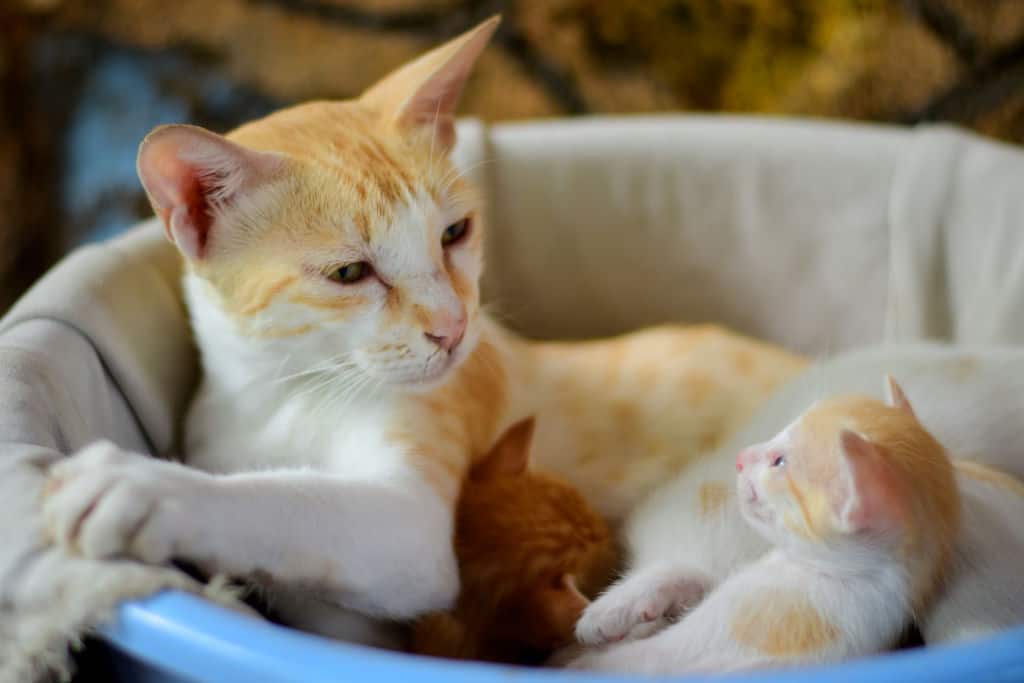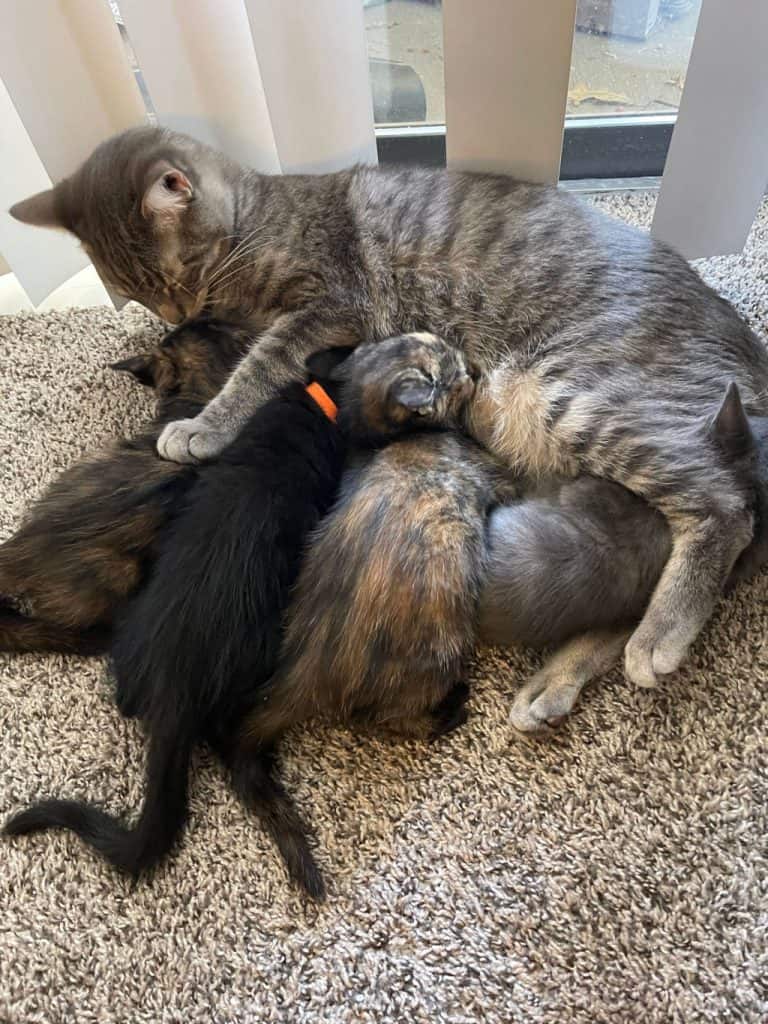Some cats have a strong instinct to protect and care for their young, regardless of their parenting experience or biological relationship with the kittens. Male cats would sometimes show this nurturing side.
This article explores how males behave around kittens, whether they can care for them, and whether there are any dangers to watch out for.

Do Male Cats Recognize Their Kittens?
Male cats may or may not recognize their own offspring because recognition is based on individual cats and can vary from one cat to another. Factors such as socialization, scent, and the amount of time spent together can play a role in a male cat’s recognition of its kittens.
It’s not uncommon for a male cat to not recognize his offspring and behave as if they are strangers.
Cats know each other primarily through scent, so any cats familiar with each other who are separated will become unfamiliar, regardless of their relationship.
If the kitten has lived with the father since birth, they recognize each other by smell and are aware of their relationship. Nevertheless, if they were apart, that sense of connection would vanish along with their familiarity.
Interestingly, a study conducted by feline behaviorists discovered that a male cat’s interactions with kittens might actually improve over time, especially if exposed repeatedly to their young.
Do Male Cats Take Care of Their Kittens?
Generally, the father does not engage in kitten upbringing, but it is not unheard of for them to provide a hand.
They may show a range of behaviors when around kittens, including indifference, protectiveness, and affection. While not common, when a male cat has a strong maternal instinct, they can take on the role of parent with love and devotion.
Some male cats may become territorial and aggressive, but others may lick and groom the kittens with tender affection.
This behavior can be seen in feral colonies as well. Some tomcats may actually “mother” kittens, usually when they are used to a loving environment and don’t need to fight for territory constantly. In cases where resources are abundant and territorial disputes are minimized, even tomcats can shift their priorities, demonstrating nurturing behaviors towards kittens as a way of promoting the colony’s overall health.
When the mother is out hunting, this usually takes the form of watching and playing with the kittens. If the kittens remain in his territory, he will typically try to keep other toms away from the kittens and mother.
In households where multiple cats reside, some male cats, after observing others tend to kittens, may become more involved in caregiving. This underscores the idea that direct exposure to nurturing behaviors might encourage similar tendencies in them.
Remember that nurturing kittens has nothing to do with sex. I have two females who are OK with kittens and one male who isn’t. The bottom line is, if your male cat looks after the kittens, you have a caring and nurturing cat.
Every cat is unique, and their behavior around kittens depends on their individual personality, past experiences, and socialization. So if you’re lucky enough to witness a male cat taking care of kittens, hold on tight because it’s bound to be a heartwarming experience.
Can a Male Cat Harm New Kittens?
Yes, a male cat can harm new kittens if he feels threatened or shows aggressive behavior toward them. This behavior can stem from jealousy, lack of socialization with kittens, or a perceived threat to his territory.
This can happen in a colony of wild or barn cats. A new tomcat gets in and seeks to establish dominance in the colony by producing his own kittens and killing the ones still nursing.
While this is possible in stray/feral colonies, it is uncommon. Females are the ones who are often more aggressive and protective. However, they frequently collaborate to defend and even co-parent their young.
Most of the time, the male father cat should be fine spending time with the newborn kittens, but only if he is not hostile. Keep an eye on them. Allow your adult cat to get used to a kitten, and ensure you take steps to help them get along.

Do Male Cats Look After Kittens Who Aren’t Theirs?
Male cats can be amazing caretakers, with some of them showing nurturing behavior to other kittens they come across. However, this is not typical behavior. Male cats usually do not stay around to help with newborns.
In general, if your male cat dislikes other cats, he will most likely dislike the kitten, whether it is his offspring or not.
I’ve discovered that neutered male cats are more welcoming of new kittens than females. Many have even been known to stay at home and adopt cats. However, this is not true for all males.
If you’re bringing in a new kitten, you should realize that males are often more laid-back. However, it all comes down to the individual cat, and the temperament of the adult cat is frequently a factor.
Given the opportunity, and with careful introduction practices, many male cats can become staunch defenders and playmates for kittens, disproving the myth that only females have this caregiving instinct.
Remember to separate them for the first few days. Slowly introduce them, and don’t leave the male alone with the kittens. When introducing, make sure to give plenty of treats to the males. And take steps if the kitten becomes unfriendly, you can take steps to win it over.
FAQs
Can neutered male cats hurt kittens?
Yes, neutered male cats can still harm kittens if they feel threatened or act aggressively against them. Neutered cats might become very protective of their territory, attacking or even killing kittens viewed as a threat.
Why would a male cat bite a kitten’s neck?
A male cat may bite a kitten’s neck to show aggressiveness or dominance. Furthermore, a male cat biting a kitten’s throat could result from their innate hunting instinct or a lack of socialization.
This behavior is cause for concern, and interactions between male cats and kittens must be monitored and supervised to guarantee their safety.
At what age are kittens safe from male cats?
Male cats of any age can harm kittens, which is why it is critical to monitor their interactions to ensure the safety of the kittens. It is recommended to wait until the kittens are at least 8-10 weeks old and have received essential vaccinations before introducing them to unfamiliar adult cats, including male cats.
Alex, a passionate animal lover, has experience in training and understanding animal behavior. As a proud pet parent to two dogs and three cats, he founded AnimalReport.net to share insights from animal experts and expand his knowledge of the animal kingdom.




